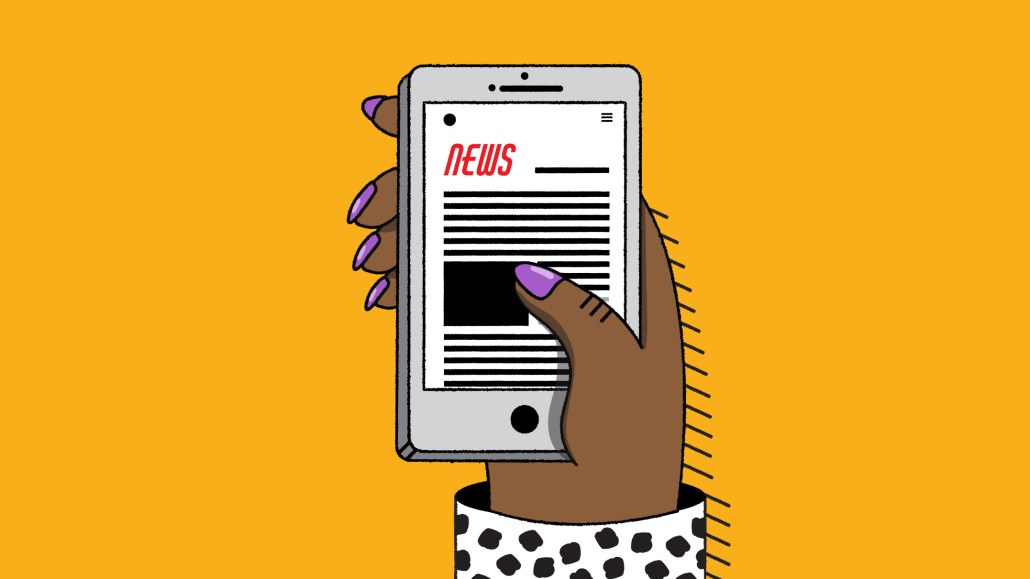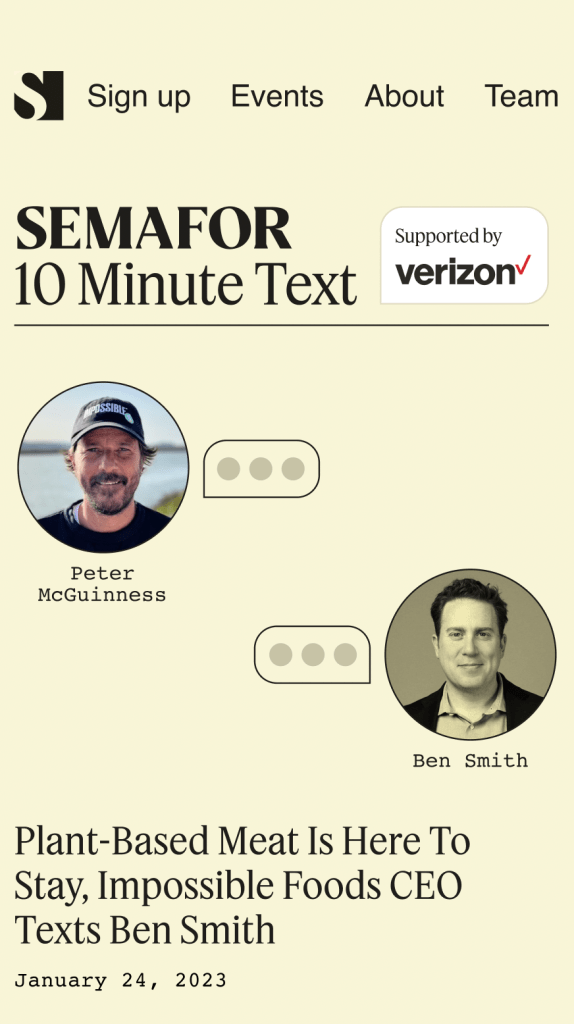Secure your place at the Digiday Media Buying Summit in Nashville, March 2-4
Semafor sells Verizon on sponsoring its text message interview series

Semafor — a start-up global news digital publisher — is expanding one of its signature editorial series with a sponsorship.
Verizon, one of Semafor’s launch sponsors, will sponsor an expanded feature from its newsletter called “One Good Text.” The series, which has spotlighted a Semafor journalist texting a question to a politician, business executive or otherwise influential person, will turn into a sponsored 10-minute interview franchise over text.
The timing of Semafor’s launch three months ago has coincided with an economic slowdown, presenting a challenge to the news publisher’s direct-sold ad business “unless they continue to come up with innovative ways to partner with advertisers and brands,” said Alex Stone, svp of advanced video and agency partnerships at media agency Horizon Media.
Advertisers are “watching every media dollar being spent” and focused on “tried and true” relationships, Stone said. But launch sponsors like Verizon are carrying Semafor through a gloomy ad market.
“Launch partnerships have represented wind in our sails,” said Semafor CRO Rachel Oppenheim. “The first quarter hasn’t been a heart-sinking experience, just because we did a lot of work across the spring, summer and fall to design these longer-term relationships.”
Q&A via text message
It was always Semafor’s intention to try and sponsor its “One Good Text” franchise, Oppenheim said. “One Good Text” has interviewed Warner Bros. Discovery CEO David Zaslav, White House Chief of Staff Ron Klain and ministers from countries like Kenya and Latvia, among others.
The texts in the sponsored, expanded version will not be edited and will appear on Semafor’s website and newsletters. Verizon’s sponsorship of the franchise will run for six months and includes the brand’s logo above the interviews. Oppenheim declined to share how much Verizon has paid Semafor for these sponsorships.
The first installment of the new weekly Q&A series — now called “10 Minute Texts” — went live Tuesday afternoon, and features Semafor’s editor-in-chief Ben Smith interviewing Peter McGuinness, the CEO of Impossible Foods.

The series “provides a window into folks’ personality and tone, and writing style and communication style, in a way that’s kind of intimate. It fosters a level of trust and transparency, which is what we’re all about,” Oppenheim said.
As part of the deal, Verizon will have its own branded text-message interview series, published on Semafor’s site once a month and promoted with paid social posts. They will be distinguished from the editorial-led ones with a “partner message” label at the top, and a headline that reads “A conversation with Verizon,” and will not appear in newsletters. Semafor CEO Justin Smith will be interviewed by Verizon Business CEO and evp Sowmyanarayan Sampath for the first installment, and other interviewees in business, tech, policy, sports and entertainment sectors will be determined by Verizon and Semafor’s business team.
It’s all part of a larger deal with Verizon throughout the year that includes digital and newsletter advertising and event sponsorships. It wasn’t clear whether this expansion was part of Verizon’s original deal or whether this was a reinvestment in Semafor from the brand.
A challenging ad market means a ‘harder sell‘
The current shaky ad market means custom content and advertorials are a “harder sell” due to advertisers’ “priorities shifting,” Horizon’s Stone said. It’s a tough environment for a publisher to find new clients that want to “go deeper than just your typical banners or pre-roll ads,” he said.
Semafor’s pitch to the ad market is focused on corporate reputation and brand reputation. The publisher reaches readers mainly in the business, policy and media sectors, Oppenheim said. She declined to share how many new advertisers Semafor has secured since its launch, and which new brands it’s received money from.
“A lot of our clients are looking for more lower-funnel evaluation and the return on investment. That’s why it’s going to be a struggle, but also why they will probably need to lean in with those clients and make sure a client is going to be more loyal,” Stone said of Semafor’s deal with Verizon.
For the majority of Tinuiti’s clients, placement in news content “really does not drive the needle,” said Nii Ahene, chief strategy officer at the performance marketing agency, where 80% of clients are retail brands, such as Etsy, Nestlé and Elf Cosmetics.
As for the other 20% of Tinuiti’s clients — mostly B2B marketers — there is a “time and place for prestige placements in digital media,” Ahene said. But it all depends on how well the publisher can either show scale or the value of their audience, such as event attendance and offering sponsored packages to do joint webinars, he said.
Advertisers “are critical of the budgets that they’re spending” right now, Ahene said. “On any sort of upper funnel channel, there’s a higher burden of showing that that media is actually performing.”
Oppenheim declined to share what sponsor metrics Semafor is guaranteeing against. Semafor has surpassed its ad revenue goals and the audience growth it forecasted to advertisers, she said, declining to say by how much. She did not respond to an emailed question asking how many people are on the sales team, but said Semafor’s commercial team (advertising, sales, marketing and product staff) had grown by 50% since its launch.
More in Media

From feeds to streets: How mega influencer Haley Baylee is diversifying beyond platform algorithms
Kalil is partnering with LinkNYC to take her social media content into the real world and the streets of NYC.

‘A brand trip’: How the creator economy showed up at this year’s Super Bowl
Super Bowl 2026 had more on-the-ground brand activations and creator participation than ever, showcasing how it’s become a massive IRL moment for the creator economy.

Media Briefing: Turning scraped content into paid assets — Amazon and Microsoft build AI marketplaces
Amazon plans an AI content marketplace to join Microsoft’s efforts and pay publishers — but it relies on AI com stop scraping for free.








